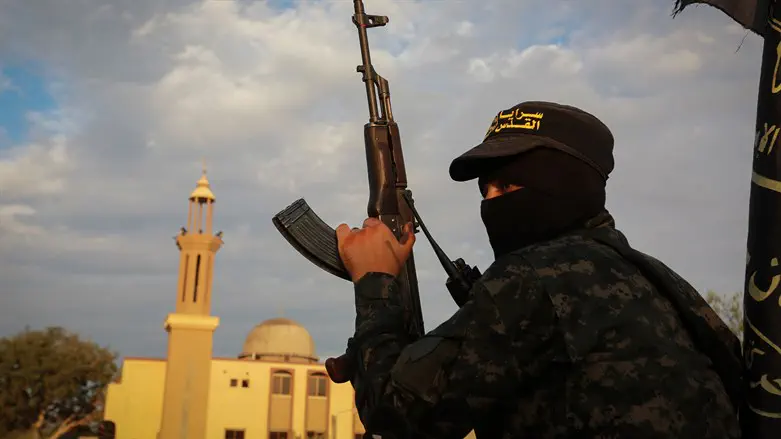
Islamic Jihad terroristFlash 90

Islamic Jihad terroristFlash 90
Reposted with permission from Stream
On June 22, Muslims murdered 25 Christians — mostly women and children — and wounded nearly 100 more inside a church in Syria.
According to eyewitnesses, one or two armed men entered the Mar Elyas Greek Orthodox Church in Damascus during mass, when it was packed with some 350 worshippers, and indiscriminately opened fire before detonating an explosive belt inside the sanctuary.
“When we got to the church, we found the doorway filled with body parts,” said a relief helper who arrived soon after the attack. Photos showed charred and blood-splattered floors, with shrapnel peppering the church walls.
While much can be said about this latest Islamic terror attack on a Christian church, my question today is simple and straightforward: Why is this not enough to prompt the United Nations and other international bodies to take notice and speak up the way they do whenever Muslims are the victims of non-Muslims?
One Act of Violence
For example, two years ago, the United Nations declared March 15 to be the “International Day to Combat Islamophobia.” What prompted this assertive move? Simple: On March 15, 2019, an armed Australian man entered two mosques in New Zealand and opened fire, killing 51 and injuring 40 Muslim worshippers.
If one attack on a mosque was enough for the UN to institutionalize a special day to speak up for Islam, what about the countless, often worse, Muslim attacks on non-Muslim places of worship? Why have they not elicited a similar response from the UN and other governmental bodies?
In case you think that June 22nd horrific attack on a Syrian church is some kind of aberration, here is a brief list of other fatal Muslim attacks on Christian churches in recent times, ordered by number of casualties.
Brace yourself.
A Long List of Atrocities
The above list is hardly comprehensive. In Nigeria alone, where one Christian is slaughtered every two hours, Muslims have destroyed or torched some 20,000 churches and Christian schools. How many undocumented souls perished in those largely unreported terror attacks?
All the Things We Don’t Even Know
Nor does the above list include any of the many botched terror attacks. For example, an attack on an Indonesian church during Palm Sunday services in 2021, where only the suicide bombers — a Muslim man and his pregnant wife — died.
Or more recently, when last year Alexander Scott Mercurio, an 18-year-old convert to Islam, was arrested in Coeur d’Alene, Idaho for “planning a suicide attack on multiple churches” to be carried out the next day. According to the report, “Law enforcement claims that he was going to attack local places of worship with knives, guns and flames.”
Nor does the above list include the daily non-fatal attacks and desecrations of churches, which especially plague European regions with large Muslim populations.
Even so, based on just the above well-documented examples, Muslims have massacred well over 1,000 Christians who were otherwise peacefully worshipping in their churches.
The Real Pattern
Hence that most pressing of questions: If one non-Muslim attack, which claimed 51 Muslim lives, was enough for the UN to establish an “international day to combat Islamophobia,” why have countless Muslim attacks on churches not been enough for the UN to establish an “international day to combat Christianophobia”?
This question becomes more pressing when one realizes that, whereas the New Zealand mosque attack was, indeed, an aberration — evidenced by its singularity — Muslim attacks on churches are very common (including historically). As discussed here, seldom does a month pass in the Muslim world, and increasingly in the West, without several assaults or harassments taking place.
Moreover, it’s important to point out that those who terrorize churches often share little with each other. As seen, they come from widely different nations (Nigeria, Iraq, Philippines, etc.), are of different races, speak different languages, and live under different social, political, and economic conditions.
The only thing they do share is their religion, Islam (which, unsurprisingly, teaches hostility for churches and “infidels,” though we’re not supposed to acknowledge that).
In other words, Muslim attacks on churches are ideologically driven, have long been and continue to be systemic and systematic, and are therefore an actual, ongoing problem that the international community needs to highlight and ameliorate.
Yet the UN would have us ignore the ongoing massacres of countless Christians and worshippers as unfortunate byproducts of misplaced “Muslim grievances” — and instead fixate on one solitary incident: a Western man killing 51 Muslims.
This, for the UN, is what truly evinces a “pattern” and is in dire need of recognition and response. And that response is to shut up all those who dare connect the dots and expose Islam’s heavily documented pattern of violence against non-Muslims — which, make no mistake, is precisely what “combatting Islamophobia” is all about.